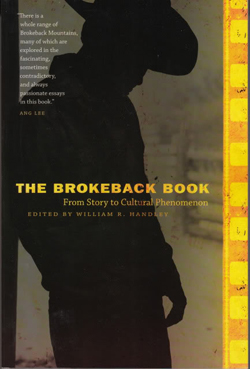For more than 75 years, Kirkus Reviews has served as the industry bible for bookstore buyers, librarians, and ordinary readers alike. Now Popdose has joined the Kirkus Book Bloggers Network, taking to the virtual pages of Kirkus Reviews Online to dish on the best — and sometimes the worst — in pop-culture and celebrity books.
All you campers who’ve been looking to earn your merit badge in Cultural Studies will want to check this one out, because this week we’re going highbrow, with a volume that approaches a populist film from a variety of scholarly angles…
 My children know Brokeback Mountain primarily as a punchline on Glee; a pretty strange afterlife for a prestige picture, an international indie production with a niche subject. But the doomed love between Ennis del Mar and Jack Twist captured the attention of moviegoers around the world, becoming one of the most-discussed movies of the decade. This collection of essays, The Brokeback Book — edited by William R. Handley and published by the University of Nebraska Press through its Bison Books imprint — is ostensibly about the film’s huge impact on popular culture and discourse, about Brokeback Mountain‘s transformation “from Story to Cultural Phenomenon,” as the subtitle puts it.
My children know Brokeback Mountain primarily as a punchline on Glee; a pretty strange afterlife for a prestige picture, an international indie production with a niche subject. But the doomed love between Ennis del Mar and Jack Twist captured the attention of moviegoers around the world, becoming one of the most-discussed movies of the decade. This collection of essays, The Brokeback Book — edited by William R. Handley and published by the University of Nebraska Press through its Bison Books imprint — is ostensibly about the film’s huge impact on popular culture and discourse, about Brokeback Mountain‘s transformation “from Story to Cultural Phenomenon,” as the subtitle puts it.
And it is, intermittently, just so. But The Brokeback Book is also, without intending to be, a book about the increasing marginalization of American intellectualism, and a story about how a business — in this case, cultural education — becomes a racket.
Any enterprise, no matter how noble its intentions, can sink into purely mercenary motives if sufficient money and prestige are involved. The argument was occasionally made about the US space shuttle program, in its waning years (most trenchantly by Gregg Easterbrook at The New Republic); the shuttle, the argument went, existed primarily to resupply the International Space Station, which in turn existed mostly to give the shuttle someplace to go. Any scientific benefits of the shuttle program to the general public were secondary to its real aim: the continued generation of revenues for the aerospace industry. The tools of exploration had become an end in themselves, rather than a means, and the endgame was simply to keep the money flowing.
Many Americans regard academia, especially theoretical fields like cultural studies, in much the same way. Certainly, part of this attitude comes from garden-variety anti-intellectualism; but sneering news reports about course offerings like “Epistemology in Battlestar Galactica” or “Madonna: Mimesis and Metamorphosis,” while always good for a cheap laugh, help to reinforce the impression. And so, frankly, does The Brokeback Book.
Read the rest of this article at Kirkus Reviews!





Comments